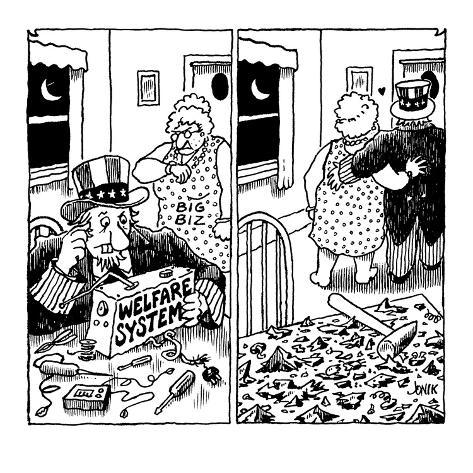The crushing blows of the Great Depression in the 1930's led to the creation of the American welfare system; a system that has transformed over decades of social and economic change. By the 1980's and 90's, policy makers were eager to make a change to the federal-based aid, hoping to cure American's of their plague of dependency. Rather than target the institution of poverty or the state which produced it, the state targeted the poor people themselves by reducing benefits and changing guidelines and restrictions to make it more difficult to receive assistance.
Bill Clinton's 1996 Personal Responsibility and Work Opportunity Reconciliation Act (PRWORA) ended Aid to Families with Dependent Children (AFDC) and introduced Temporary Assistance to Needy Families (TANF), an aid system that only allows families to be on 'roll' for 5 years. Sadly, even those families that are objectively eligible, receiving TANF is incredibly difficult.
Welfare reform reduced rolls by 59% (or about 7 million people). What was seen as a great success by politicians and policy makers was really just making those in poverty poorer without access to assistance. With the economic recession in 2008, poverty has only increased.
The reforms also targeted Supplemental Security Income (SSI) and disability aid, making eligibility more stringent and requiring types of documentation that is often difficult for those in poverty to obtain. The denial rate for homeless adults applying for SSI and SSDI is 80%, and 70% for all initial general claims! But welfare benefits aren't the only thing shrinking, welfare employees are also dwindling, leaving offices overwhelmed with never ending cases and pressure to push recipients off the roll. With Congressional pressure to make welfare reforms following the sequester earlier this year it is only a matter of time before poverty reaches epidemic proportions in the U.S. We are no longer ending poverty, but feeding it.
Bill Clinton's 1996 Personal Responsibility and Work Opportunity Reconciliation Act (PRWORA) ended Aid to Families with Dependent Children (AFDC) and introduced Temporary Assistance to Needy Families (TANF), an aid system that only allows families to be on 'roll' for 5 years. Sadly, even those families that are objectively eligible, receiving TANF is incredibly difficult.
Welfare reform reduced rolls by 59% (or about 7 million people). What was seen as a great success by politicians and policy makers was really just making those in poverty poorer without access to assistance. With the economic recession in 2008, poverty has only increased.
The reforms also targeted Supplemental Security Income (SSI) and disability aid, making eligibility more stringent and requiring types of documentation that is often difficult for those in poverty to obtain. The denial rate for homeless adults applying for SSI and SSDI is 80%, and 70% for all initial general claims! But welfare benefits aren't the only thing shrinking, welfare employees are also dwindling, leaving offices overwhelmed with never ending cases and pressure to push recipients off the roll. With Congressional pressure to make welfare reforms following the sequester earlier this year it is only a matter of time before poverty reaches epidemic proportions in the U.S. We are no longer ending poverty, but feeding it.
Sources: http://truth-out.org/news/item/15727-npr-attacks-disability-bolsters-new-consensus-against-welfare


No comments:
Post a Comment